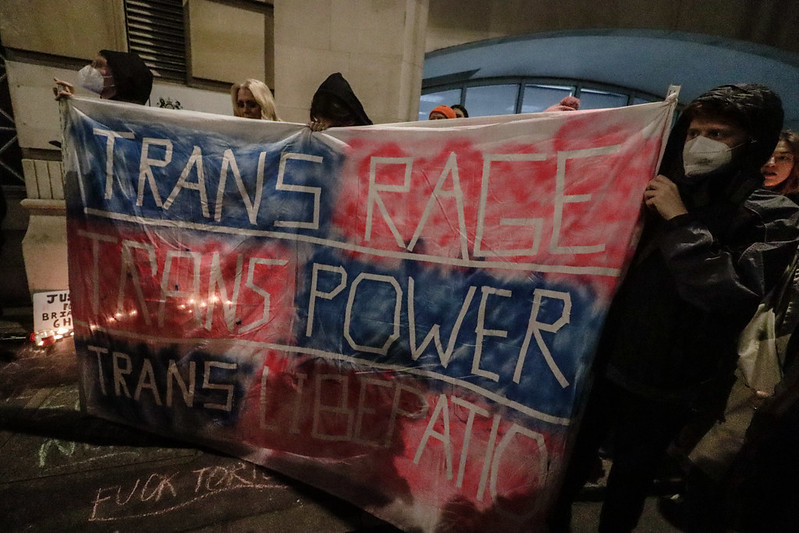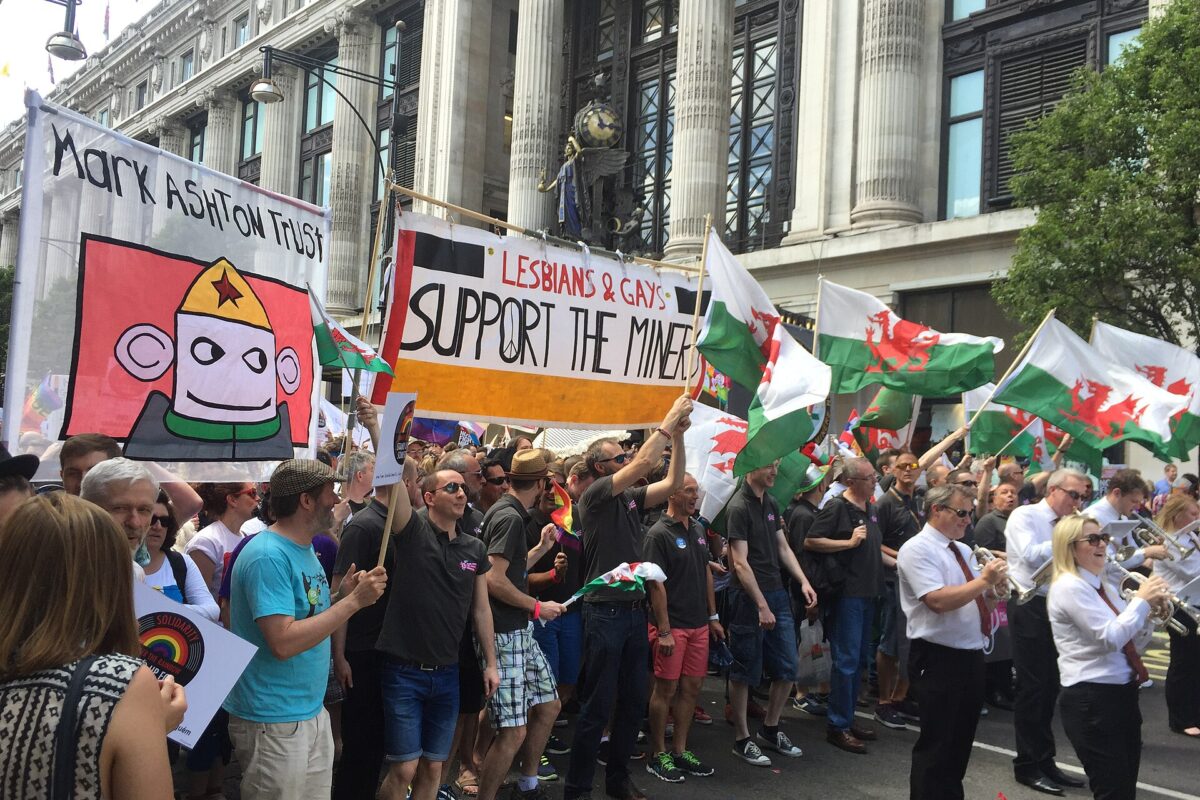On February 11, 16 year-old Brianna Ghey, a trans school student, was stabbed to death in a Warrington park in the North of England. Two teenagers were arrested for her murder. At first the police claimed there was no transphobic motive but they later suggested that it might indeed have been a hate crime.
Over the following week, dozens of large and angry vigils were organised in towns and cities across the UK. In Manchester three thousand people queued to get into the vigil, there were six hundred in Liverpool, over five hundred in York, over four hundred in Leeds.
Speeches at the vigils expressed rage and sadness at her murder. They clearly tapped a vein of visceral anger that has been building over the accelerating attacks on trans people in the UK and elsewhere. These attacks are driven by the right, even if some feminists and even some on the left allow themselves to be drawn in.
Tories, bigots and whole sections of the media in the UK give free rein to transphobic tropes and gender critical voices. Rarely – vanishingly rarely – do they allow trans people’s voices to be heard. The attacks increase trans people’s fears for the future, but also generate resistance and significant radicalisation among young trans people and their supporters.
Brianna’s murder was shocking but sadly, not such a surprise. Hate words inevitably lead to violence and hateful actions. These grow more serious. In late April there was an arson attack on the home of two trans people and a gay man in Whitechapel, London. Trans people are increasingly a community under attack. Trans health care is being steadily and stealthily undermined; funding for support organisations curtailed and rights challenged by crowd-funded legal assaults which have raised hundreds of thousands of pounds. Many trans people justifiably feel their very existence is under direct threat.
Murders like that of Brianna Ghey may be rare in Britain, but tragic and avoidable suicides of desperate and marginalised trans people are far from rare.
Culture Wars
At the vigils many trans people said it felt like a moment had been reached, in the fightback against the transphobic moral panic. Desires for active resistance to transphobia coincide with a wave of strikes fuelled by high inflation, soaring consumer energy prices and cuts in real pay.
The strikes that began nearly a year ago are immensely popular drew hundreds of thousands of workers into action against a Tory government which trails by 20 points in polls. The Tories just lost hundreds of councillors in the local elections in England. The standard response of governments and regimes in crisis is to ramp up oppression and scapegoat vulnerable groups to divert from their problems.
Resistance to attacks on living standards, transphobia and racist attacks on refugees and migrants has never been so important or so interlinked. ‘Culture wars’ are intended to divide our side, to pit one oppressed group against others and divert anger away from the real culprits, the bosses, the rich and the Tories. Yet there’s a truth that history teaches us – one oppressed group never betters itself by attacking the rights of another or siding with a ruling class against a vulnerable minority. The fortunes of oppressed groups rise together or they fall together.
On the right, the organisations and individuals who attack trans rights also attack women’s rights. Women’s lives don’t improve as the lives of trans people come under attack. In Hungary Viktor Orban’s right wing populist government followed up attacks on trans people by restricting abortion rights, banning gender studies at universities, and declaring LGBT+ rights to be inimical to the nuclear family. In Russia Putin’s government has for years attacked trans and LGBT+ rights. Putin’s tame parliament, the Duma, is now considering a new law to declare feminism an ‘extremist ideology’.
In the US right-wing zealots pushed over 450 anti-trans bills at state level, including genital inspections of children playing school sports if suspected of ‘being trans’, or prosecuting parents of trans children for supporting their child. They also celebrate the Supreme Court overturning Roe v Wade. They also campaign to ban sex and relationship education in schools.
In the UK, the Tory government blocked the vote in the Scottish parliament earlier this year to update and amend the Gender Recognition Act to introduce self-ID. The same government continues to cut funding for domestic violence refuges and refuses to address the gender pay gap. Sunak’s weak and unpopular government plans to force schools and teachers to report LGBT+ children to their parents, directly putting many such children at risk. They drawing from the playbook of anti-trans zealots like governor Ron DeSantis of Florida. De Santis just visited the UK and heaped praise on Tory transphobes like Kemi Badenoch, the Equality Minister.
The fake-feminist gender critical organisations that emerged in the past six or seven years (Fair Play for Women, Women’s Place UK, the LGB Alliance, For Women UK and so on) do not speak for women or even a majority of feminists despite their claims. The vast majority of women’s organisations offering support in areas like domestic violence and rape remain trans inclusive. Indeed, at least one of these organisations was sued by gender critical groups because it employs a trans person.
This in itself gives the lie to the notion that gender critics and transphobes are only interested in protecting women and girls. It comprehensively reveals the hypocrisy of their claims to defend women’s rights. In reality their only purpose is to focus their ideological hostility and political energies on attacking trans people’s legal and human rights, and exclude them from the social spaces they have used for decades.
They ignore the very real threats to women’s rights. They often work with the most reactionary defenders of traditional values and the nuclear family. This includes accepting funding for legal challenges, conferences and so on from the very organisations that work to undermine women’s reproductive rights, bodily autonomy and equal rights.
They bring together people who may claim that they just ‘have concerns’, or just ‘want to debate’ or ‘just want to safeguard women and girls’. But as they become right-radicalised, their resistance to rational argument; their unwillingness to accept credible scientific evidence; and their ideological dogmatism underpinned by sex essentialism and shared hostility to ‘gender ideology’ – tag them as a cult-like hate movement.
Cover for Fascists
Many provide political cover for fascists and antisemites. Their enabling of the far right is the price they pay to promote their shared transphobic aims. Gender critics are notoriously slow to distance themselves from fascists and the right, including their antisemitism. Many legitimise the far right’s transphobia by citing their right to ‘free speech’.
Their shameful political blindness to the far right and fascist organisations constitutes a dangerous entry point for the right’s views. Their ‘anti-woke’, conspiracy theory, anti-working-class agenda, opens the door to fascists – who see trans rights, and anti-migrant agitation, as wedge issues to attract a larger audience.
Since mid-2022 fascist groups like Patriotic Alternative, Hearts of Oak and individuals like Tommy Robinson, often posing as ‘concerned parents’, have been trying to shut down Drag Queen Story Hour events. They and the gender critics have attacked those as examples of ‘grooming’ by ‘gender and sexual perverts’ undermining the nuclear family.
In Australia sieg heiling neo-Nazis supported Posey Parker’s recent ‘Let Women Speak’ tour, was funded by wealthy US organisations like CPAC, the Conservative Political Action Coalition. The protests in Australia and New Zealand were large, angry and successful. Parker (real name Kelley-Jay Keen-Minshull) was forced to cut short her tour and scuttle home.
Yet despite the press and media showcasing of ‘gender critics’, they’ve actually had limited impact on public attitudes towards trans people. Large UK surveys in 2022 – the ‘More In Common study’ – showed attitudes to trans people remain broadly either supportive or non-committal. A recent Fox News poll in the US found that 57 percent of the population are unhappy with the attacks on trans children.
What’s also been great has been the size of many of the counter-protests in support of Drag Queen Story Hour which have severely blunted the campaigns to shut them down. This is not restricted to the UK. A recent counter-protest in Vienna on April 19 drew over 1000 people to defend the event against around 200 assorted fascists, Catholic bigots and members of the youth wing of the far-right Freedom Party.
Building Resistance
Trans people and their supporters are angry and there’s a growing sense of urgency about building resistance to the onslaught. The minimum waiting time for an appointment at a UK gender clinic is now around 5 years; reported hate crimes against trans people jumped by 56% in one year; gender clinics can’t find staff because applicants fear they’ll attract hate press and social media pile-ons. It’s time to fight back.
Socialists start not from weighing up who’s more oppressed than someone else but from a position of unconditional support for all the oppressed. We aim to be, as Lenin urged over a century ago, tribunes of all the oppressed and exploited. We recognise that oppression in the capitalist system is endemic. It stems from social class, class struggle and the social relations of production and reproduction that arise from this exploitative system. The blind drive to maximise the accumulation of capital spawns one existential threat to humanity after another, encouraging those in power to ‘divide and rule’ and ramp up the oppression of vulnerable sections of society.
The ideology of the nuclear family and the heteronormativity and gender binary assumptions inherent to it are why sexism, misogyny, homophobia and transphobia are so deeply rooted in capitalism. Women’s liberation, gay liberation and trans liberation require the overthrow of the system before they can be achieved.
Building united fronts to defend trans rights is an urgent necessity. These must pull together trans and cisgender people with quite diverse understandings of oppression but who recognise we must stand together against the bigots. For Marxists we go further – we understand the need to see what Marx called the totality of the capitalist system. That requires collective class resistance to fight oppression, and goes hand in hand with fighting the exploitation we face in the workplace.
We argue for building a revolutionary political organisation to unite the most class conscious workers organised to overturn the power of the capitalist ruling class. We need organisations to mobilise the tremendous collective power of workers. Most trans people are also working class and it’s in the interests of not just them but the whole working class to fight transphobia. Just as it is in the class’s interests to fight racism, Islamophobia, antisemitism and sexism.
That’s one reason why it’s so important to fight for trade union involvement in the protests against transphobia, to get banners and delegations from workplaces and unions along to trans pride events, vigils and commemorations. That’s not always a popular position to hold today among trans people. Some activists influenced by identity theory and privilege theory think that trans people should only organise by themselves. But this hardly makes sense when trans people are probably less than one percent of the population. It also relegates cis supporters to the status of ‘allies’, a concept that runs counter to the socialist notion of solidarity.
Some trans activists, especially if influenced by autonomist politics, can be suspicious of trade union and socialist involvement in the fightback. This runs against the need to build the broadest possible working class united fronts against transphobia. We are stronger together, and we need to recognise and involve the potential power of workers in the workplaces. Not least because much trans hostility happens in the workplace and in employment discrimination. Fundamentally a divided working class risks catastrophic defeats.
We socialists say that history is not on the side of the transphobes. We can and will organise to roll back attacks, and we can win. But to permanently stop reactionaries from attacking our gains, we have to pose the big questions. That is how to achieve not just ‘tolerance’ or even ‘acceptance’, but respect and liberation. As capitalism continues to give rise to ever more existential crises for humanity those questions, and the answers that Marxists offer, can no longer be ducked or postponed.




